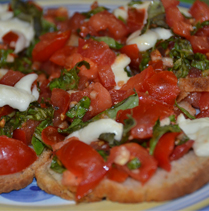
- Eat a variety of foods while you are pregnant. Research shows that infant’s food preferences develop while still in your uterus. If a pregnant woman only eats potatoes and cheese, her child might not want to try foods with stronger tastes. If they do try it, it may take them longer to learn to like it.
- Continue to eat a variety of foods while you are breastfeeding since breast milk also contains the flavors of the foods you eat. Children who are breastfed are more likely to try and like the foods that they recognize from their mother’s milk.
- Even before your child is ready for solid foods, have them spend time with you while you cook in the kitchen. The aroma and smell of the food can encourage them to try foods later on in life.
- When introducing solid foods, and even once solid foods are well established, introduce one new food every 2-3 days if there is no evidence of an allergic reaction. The new food can be in addition to a food that is already well-liked and even mixed into or dipped into a well-liked food. Try to step out of your comfort zone and purchase foods that you don’t normally consume. For example, even if you never eat avocado, you should still introduce it to your growing child. Similarly, even if you usually choose jarred baby foods, also introduce cooked fresh fruits and vegetables as they have different flavor profiles. A child who eats jarred bananas may never learn to like a fresh banana.
- At any childhood age, never assume that your child dislikes a certain food because they refuse to eat it once, twice, or even ten times. It may take your child 12-15 attempts to acquire a taste for a new food. Leave a small piece of the food on their plate, along with other foods the child does enjoy. Hopefully, they will pick it up, touch it, smell it and even try it after seeing it a few times. And a few attempts after that…they may even enjoy eating it! (Try not to act too surprised, overjoyed, or full of praise when this happens.) On the other hand, if you force them to try it, that can backfire and the child may have negative associations with that food. On a similar note, when in the presence of your child, never mention to another adult or child that your son/daughter does not like a certain food. If you tell them they don’t like it…they won’t like it.
It is never too soon to start encouraging healthy eating habits! Give your family’s diet an honest look.









